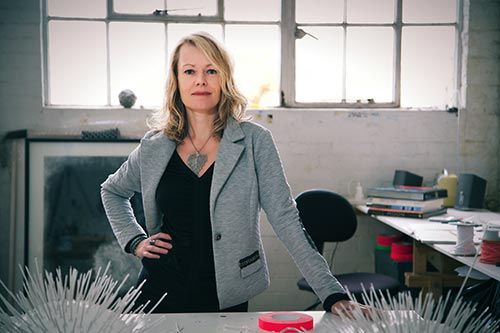Q&A with Entrepreneur-in-Residence Tine Bech
Cass' Entrepreneur in Residence Tine Bech talks us through her time at the school and how play is important to society
Cass' Entrepreneur in Residence, Tine Bech talks us through her time at the school and how play is important to society.

How did your partnership with Cass come about?
Through Creativeworks London and its Arts and Humanities Research Council (AHRC) funded Creative Entrepreneur in Residence scheme. It was a great opportunity to work with people outside the creative industries and outside creative arts and design education. I was also keen to grow my own business learning curve.
How long have you been at Cass?
The project start date was autumn starting with research into play from both Cass and myself, then two months of intensive engagement in December and January.
What have you been doing in your time here?
Engaging with and being inspired by the people I met across the university to develop something specifically for Cass and City University.
Tell us about the event on the 28th January?
We will be sending people to the future, giving permission for participants to play, to see things anew and thereby learn.
How can play influence business?
I believe that play is important to society as a whole, including business, it is part of our social fabric, of how we bond. In the context of my work, I don’t define play as about children. I view play culturally and as part of adaptation. Our own evolution and survival as a species shows the centrality of play. Play and risk are closely related, we learn how to deal with risk through play – through exploration, testing and learning. Play is also a method for thinking which can lead to innovation.
Where do you get your inspiration from?
I am very inspired by site and place, the city, and how we move through places and connect including serendipity. Also I am inspired by materials, by things of beauty.
What have you learned from your time at Cass?
How different fields have different languages and how we need to be able to speak others languages, this is at the core of communications. In many situations we are not so far apart, we just have different languages. Business management is much more “human” than I thought. I went to lectures and read texts – a lot of it was about systems management but also about human management. People from creative industries see business really as very systematised but it is much more alive than that. At the same time, businesses really are heavily structured, which is different to creative fields. I have learnt about my own field by engaging with others..
What do you think Cass has learned from you?
We will find out on the day but I hope they have learned there are still new ways of looking at things, alternative ways of looking at things generally, and at new methodologies for understanding. Also I hope they are being inspired by my enthusiasm for play. I hope they will accept my advocacy for serious play which is often misunderstood.
Do you think this is the start of a longer relationship with the school?
Yes, indeed with the wider University also. I have already agreed to work with the School of Engineering. I am keen to continue with the work on new spaces and there is scope for exploiting new types of research data still further.
Have you worked in Higher Education (HE) before or has this been a new experience?
I have worked in Higher Education as a senior lecturer and a doctoral researcher leading to my PhD last year in interactive art and play theory. My specialism is art, sculpture, technology and play theory. I am member of the Digital Culture Research Centre (DCRC) at the Pervasive Media Studio at Watershed, Bristol.
See what was Tweeted about #space2050
See a Storify summary of our Space 2050 event.
Check out photos of the event here.